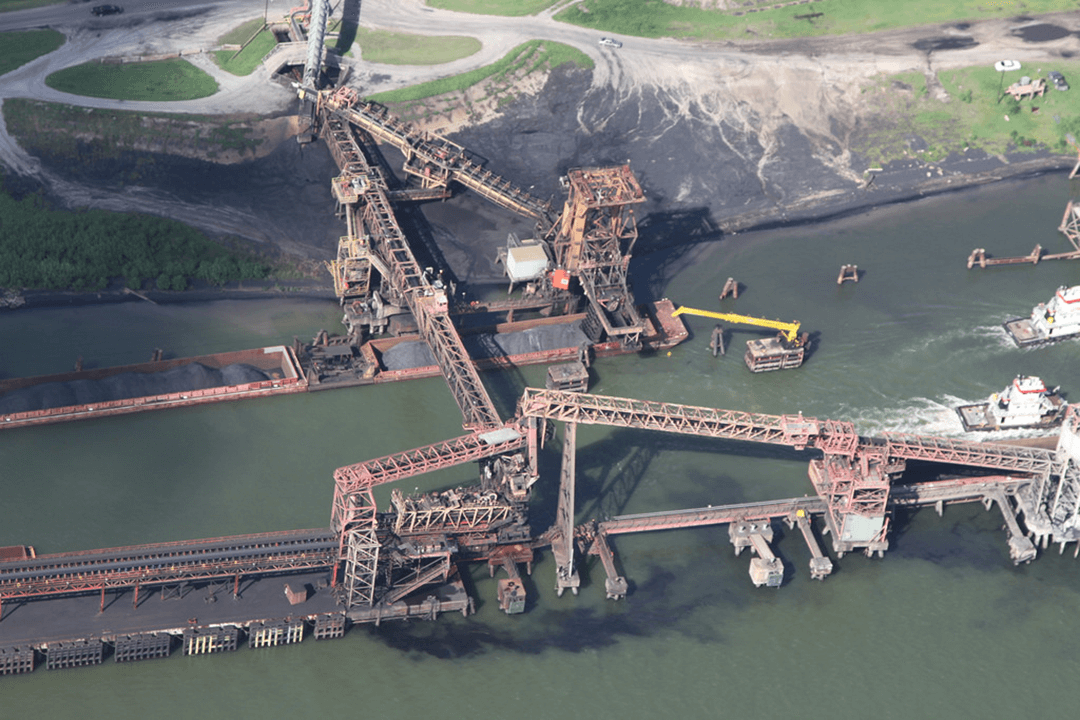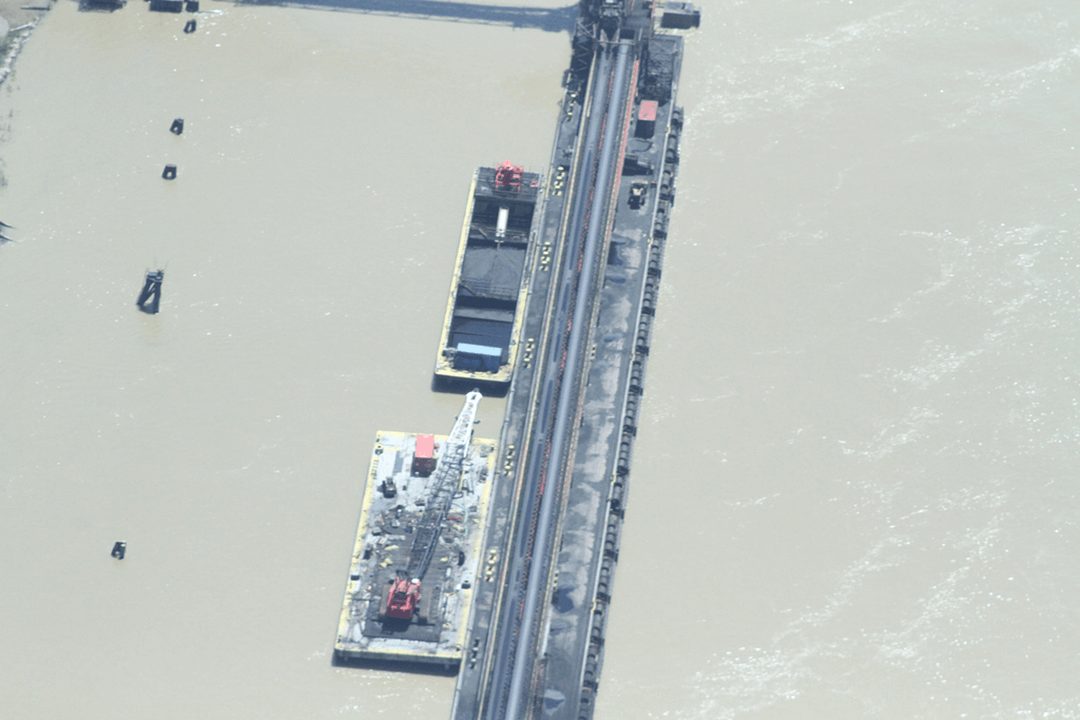Featured Communities – Plaquemines Parish, Louisiana
This piece was written by Matt Rota, Healthy Gulf, in long term partnership with residents of Plaquemines Parish.
Plaquemines Parish (Louisiana calls its counties parishes) borders the Mississippi River throughout its final 70 miles. Dozens of polluting industries border the river throughout its final sprint to the Gulf of Mexico. With increased hurricane intensity and rising seas, Plaquemines Parish, especially Black and Indigenous communities, have struggled to maintain their communities and ways of life. Communities such as Ironton, one of Coastal Louisiana’s oldest Black communities, and the Grand Bayou Indian Village, home to the Atakapa-Ishak/Chawasha Tribe are under constant threat from industrial pollution as they struggle to recover from seemingly endless hurricanes.[1][2]
Summary
During monitoring flights after the BP Oil Drilling Disaster, organizations started to notice that every time they flew over the United Bulk Terminals coal and petroleum coke (petcoke)[3] operation, a black plume could be seen stretching from the facility down the Mississippi River. The United Bulk Terminal consists of a massive pile of coal and petcoke as well as the equipment and conveyors that load and unload that coal and petcoke from and to barges and ships on the Mississippi. Observers saw this plume during every monitoring flight, especially when ships were loaded and unloaded[4]. EPA has determined that when water runs off coal and petcoke piles, the water can flush heavy metals, such as arsenic and lead, into nearby bodies of water.

Figure 1. Petcoke and coal debris flowing from United Bulk Terminal, even when no loading/unloading was occurring. August 25, 2012. Photo: Healthy Gulf. Flight courtesy of Southwings.org.
Coal and petcoke dust also blew off the conveyor belts and piles into surrounding wetlands, communities, and waters. The coal and petcoke were documented by Healthy Gulf and NOLA.com | The Times-Picayune:
“The Times-Picayune, spotted coal and coke debris, some as large as fists, dotting mile-long stretches of elevated marsh platform created by coastal restoration programs that were pumping sediment inland from the Mississippi River into open water near Lake Hermitage and Bayou Dupont on Plaquemines’ west bank.”[5]
After observing this regular and consistent pollution in the Mississippi River, organizations[6] filed a Notice of Violations and Intent to File Suit under the Clean Water Act (also known as a “60-day Notice” or “Notice of Intent”). This notice of intent alerted United Bulk that they were violating Sections 301 and 402 of the Clean Water Act.
The Clean Water Act authorizes any individual to file a civil action against any person in violation of an effluent standard or limitation. In this case, United Bulk Terminals did have a discharge permit[7], but was only authorized to discharge stormwater into waterbodies to the east. There were two arguable ways that this facility was in violation of its Clean Water Act permit:
- Section 301 of the Clean Water Act prohibits “discharge of any pollutants into the waters of the United States without a permit. While United Bulk Terminals did have a permit to discharge stormwater into other waterbodies, there was no permit to discharge into the Mississippi River.
- Section 402 requires that dischargers comply with their discharge permit requirements. United Bulk Terminals’ permit stated they were to “clean up and dispose of all spilled product and other spilled wastes immediately.” Since it was clear they were not cleaning up the spilled petcoke and coal, they were in violation of their permit.
Additionally, even if this plume of petcoke and coal were discharged into American Bay, the waterbody they were permitted for, they would have been in violation of the narrative criteria in the permit: “there shall be no discharge of floating or settleable solids of visible foams in other than trace amounts, nor of free oil or other oily materials, nor of toxic materials in quantities such as to cause toxicity to aquatic organisms.”[8]
While United Bulk Terminals did negotiate after receiving the Notice of Intent, no settlement could be achieved before the Notice expired, so in March 2014, the organizations filed suit, resulting in Gulf Restoration Network, et al. vs. United Bulk Terminals Davant, LLC.
In this case, the parties continued to meet and negotiate throughout the process, and a settlement agreement was reached in 2015, resulting in a Consent Decree. In this settlement, United Bulk Terminals’ requirements included:
- Regularly inspect and maintain conveyor belts and chutes
- Immediately clean up any material spilled on the ground
- Stop loading and unloading during high winds
- Utilize water sprays to minimize dust
- Give funds to a local nature sanctuary to help control invasive species and reforest the area, and continue to make additional payments for each day of future violations
- Pay attorney and expert witness fees
- Install a curb along the docks to prevent the spillage of coal and petcoke
- Conduct site visits
After the Suit
While United Bulk Terminals is still handling coal and petcoke on the Mississippi River, regular plumes do not flow from the facility any longer. In subsequent years, this facility will still need to be monitored, and obviously there are still the climate impacts related to the burning of the coal and petcoke overseas, exacerbating the climate impacts to coastal Louisiana.

Figure 2. After a new curb on the dock, and new cleanup requirements, coal is going in the barge, not the Mississippi River. April 2018. Photo: Healthy Gulf. Flight courtesy of Southwings.org
The Mississippi River is now cleaner thanks to the Clean Water Act. The coal and petcoke from United Bulk Terminals is restricted to the barges, ships, and piles. A simple curb prevents the pollution on the River, and backhoes can be seen cleaning the dock after every shift.
Footnotes
[1] https://healthygulf.org/2021/09/28/ironton/
[3] Petroleum coke, or petcoke is a byproduct produced by the refining of oil.
[4] These flights were performed primarily by Healthy Gulf, SouthWings, and the Louisiana Environmental Action Network (LEAN).
[5] https://www.nola.com/news/environment/article_3b2563f3-ec6b-50e2-baab-af1c2eacfbe0.html
[6] The organizations were Healthy Gulf (formerly Gulf Restoration Network), Louisiana Environmental Action Network (LEAN), and Sierra Club. The organizations were represented by the Tulane Environmental Law Clinic.
[7] National Pollutant Discharge Elimination System (NPDES) permit.
[8] https://edms.deq.louisiana.gov/app/doc/view?doc=7916218




